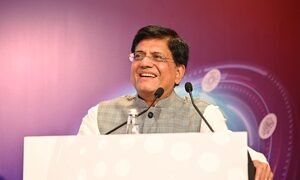
Seoul, April 24 (IANS) The South Korean economy posted negative growth from three months earlier in the first quarter, the first on-quarter contraction in nine months, central bank data showed on Thursday, amid a domestic political crisis and uncertainties stemming from the Donald Trump administration’s sweeping tariff scheme.
The country’s real gross domestic product (GDP) — a key measure of economic growth — contracted 0.2 percent in the January-March period from a quarter earlier, according to the preliminary data from the Bank of Korea (BOK).
On a year-on-year basis, the economy contracted 0.1 percent in the first quarter of 2025, compared with 1.2 percent on-year expansion in the previous quarter, the data showed, reports Yonhap news agency.
Asia’s fourth-largest economy expanded 1.3 percent in the first quarter of 2024 but slipped into contraction in the second quarter with a 0.2 percent decline, before barely growing 0.1 percent in both the third and fourth quarters.
In its forecast presented in February, the BOK expected the economy to expand 0.2 percent in the first quarter.
“Prolonged domestic political uncertainty and rising risks in global trade environments due to uncertainties stemming from the U.S. tariff policy have delayed the recovery in consumer and investment sentiment,” BOK official Lee Dong-won told a press briefing.
“Unusual factors, such as deferred demand for high-performance semiconductors, the suspension of projects at some construction sites and large-scale wildfires also served as downward pressures on economic growth,” he added.
Exports declined 1.1 percent from three months earlier in the first quarter due mainly to slower shipments of chemicals, machinery and equipment.
Facility investment dipped 2.1 percent on-quarter, while construction investment plunged 3.2 percent.
Private spending also fell 0.1 percent in the first quarter, due largely to weakening demand for services, and government spending edged down 0.1 percent.
The unexpected negative growth came Former President Yoon Suk Yeol’s shocking imposition of martial law on Dec. 3 caused a political chaos and dampened consumer spending. Yoon was removed from office on April 4.
The U.S.’ sweeping tariff scheme has also affected the trade-dependent South Korean economy. Trump earlier announced “reciprocal” tariffs that include a 25 percent tariff for South Korea, though he soon decided to put on hold its implementation for 90 days.
Apart from the reciprocal tariffs, auto and steel tariffs are already in place.
The BOK earlier presented a 1.5 percent growth outlook for the South Korean economy in 2025, but told reporters last week that the forecast may have been “too optimistic,” given Trump’s tariff policy, including its sectoral tariffs and levies on China.
“Any rapid turnaround in domestic demand seems far from easy, but there is a possibility of a slight improvement of private consumption in the second quarter,” BOK official Lee said, pointing to eased political uncertainty following Yoon’s impeachment and the BOK’s combined 0.75 percentage point rate cuts since October.
—IANS
na/






